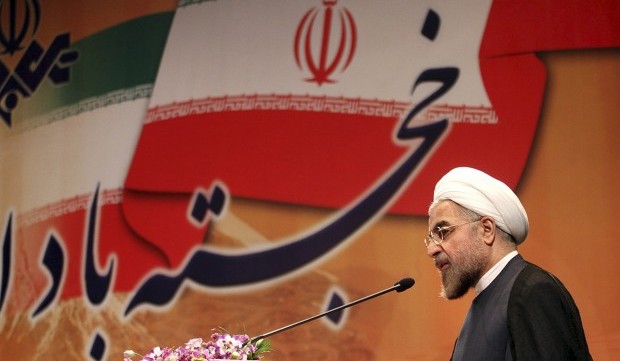
n this photo released by the official website of the office of Iranian President-elect Hasan Rouhani, Rouhani speaks in a conference in Tehran, Iran, Saturday, June 29, 2013. (AP)
The speech was part of a conference on media horizons at Iran’s state broadcasting headquarters in northern Tehran. During the speech, president-elect Rouhani expressed a robust and clear message regarding his intentions to preside over a moderate and rational government, describing this as a necessity for Iran and the Iranian people.
Rouhani reiterated his campaign promise to protect all citizens rights and entitlements, saying his government will be inclusive for all Iranians, regardless of their political, religious, or ethnic backgrounds.
The speech was carefully balanced in tone and content, dealing with the majority of his pre-election promises and criticisms of the status quo. Rouhani praised the inherent morality of the Iranian people and urged authorities to respect individual freedom, in particular in dealing with the younger generation.
Rouhani was keen to acknowledge the natural desire of people to pursue and express happiness, asking the relevant officials in charge of monitoring social conduct to demonstrate sufficient understanding and tolerance.
“The era of monologue media is over; we are living in a dialogue driven world with plenty of media outlets available to the people,” the president-elect told a packed-conference hall at Iran’s state TV headquarters.
Rouhani showed no hesitation in sending a clear and explicit signal to the head of Iran’s state broadcasting agency and his deputies who were present at the event that a monopoly on the media is no longer feasible.
Following his election victory, many observers have speculated about Rouhani’s capability—or sincerity—in implementing the electoral pledges he made during his presidential campaign which culminated in him winning more than 18 million votes.
This has resulted in intense public conjecture regarding who Rouhani intends to appoint as cabinet ministers. In his speech, Rouhani categorically ruled out a number of media predictions regarding future ministers, reconfirming that the selection process is ongoing and the final list has yet to be drawn up.
It is very difficult to analyze Rouhani’s intentions to implement his campaign promises without knowing who he intends to appoint as ministers in Iran’s 11th cabinet after the 1979 Islamic revolution.
A critical point in his speech was Rouhani’s emphatic reminder that all officials are accountable to the law and nobody—regardless of position or authority—is above this.
Rouhani made reference to the damage that double-standards in the application of law and morality can have in his speech, emphasizing: “It is not acceptable that we highlight the injustice done by our enemies but brush away the same injustice done by our friends”.
“Moderation in foreign policy means constructive interaction, not submission and confrontation,” Rouhani added.
The president-elect seemed to advocate a rational foreign policy aimed at ensuring Iran’s national and security interest, away from the falsely self-righteous approach promoted by the Ahmadinejad government
Rouhani will assume office on August 3 in a ceremony at the Supreme Guide’s residence during which his presidential accreditation will be signed by the leader of the Islamic republic according the Article 110 of the constitution. The new president will then have 2 weeks to introduce his cabinet members to the parliament for vote of confidence.
